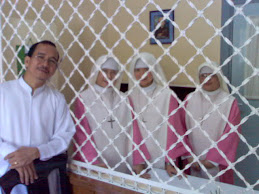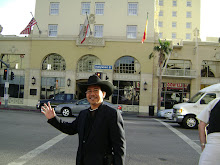Let me share here my reflection submitted to a confrere's blog for the Christmas season. Thanks Frs. Jerome and Randolf for the initiative to have this series of reflections.
The nursery home in every hospital has always been a very amusing place. That is especially true when the father gets to see his son for the first time. Together with his wife, they would look at the baby and oftentimes say the following words: Father: “Look at his nose, it looks like mine.” The wife would say, “Yes, look at his forehead, very much like yours and your father’s. He really is your son.”
Though we know that St. Joseph was not the biological father of Jesus, there appear traces of Joseph’s influence on his foster child. Hoping that we can get some model for our fatherhood on our sons (and daughters, and modeling for motherhood as well for those matters), let’s look at some of them:
1. Joseph must have been really in love with Mary, his wife-to-be. The Scriptures we have just read tell us that he “was unwilling to expose her to shame.” He knew that a woman in Mary's situation would have very easily landed in a very precarious situation – being killed by stone-throwing at the city gate. But Joseph’s love became her security and that of the baby Jesus in her womb. Her honor was something that Joseph must have really treasured in his heart. When a man really loves a woman, that love is best expressed in protecting her honor and dignity before others. Haven’t we heard many a man with chivalry say that “this is the woman I married” ("siya ang pinakasalan ko"). Isn’t this the content of the covenant sealed in the sacrament of marriage – when both husband and wife pledge love and loyalty and preserve the good honor of the other?
Joseph’s love for Mary, a woman, may have become the primal example of the Lord Jesus’ sound respect for women. Didn’t he have a lot of women following and serving him in his many journeys? Didn’t he literally free the woman caught in adultery (“in flagrante delicto” as lawyers would love to quote) by saying that “if nobody is left to accuse you, neither would I.” This would have been Joseph’s line spoken to Mary, had the evangelist Matthew allowed a dialogue between them during this stage in their lives.
Before I bring in the second point, allow me to share a text message I had just received the other day. It reads: “Now it can be told why Jinky cried ang was very emotional during the homily at the Mass after Manny’s historic victory over Cotto. The priest pala made a mistake. Nasabi daw ng pari: “Manny, Jinky, ito ang payo ko sa inyo: hayaan ninyo na nasa gitna lagi ninyo si Krista.” Of course the priest was supposed have told Jinky and Manny to allow Christ – Kristo – to stay in their midst, in their marital life.
2. Joseph must have been a very God-fearing righteous man. From the example of Joseph we see two qualities of a righteous man: respect for the law, and fear of God. The law contains a capacity to make us in society live in order and decency. When we live against it or have committed an infraction against the law, we are accountable to its sanctions and penalties. However, we may notice that the law can be really cruel, particularly in the case of the law that imposes the death penalty. That is why the fear of God has to go side-by-side with our respect for the law. We often hear that “what is legal may not necessarily be moral.” The sound foundation of morality rests on the primacy of God over everything, and our fear of Him Who knows everything. Hence, we are shown in the readings today Joseph in a dream. As psychologists would love to say, dreams often tell us something about the conscious activities of every one during our waking hours. When something really bothers us, it can continue into the dream state. We can then imagine Joseph searching and asking questions like “How do I solve this problem (like Maria, as in that famous song)?” His heart must have been reaching out to God for an answer, and even praying “not as I will but as you will, O God,” which God answers through the dream.
When we extend that unwritten prayer dialogue between Joseph and his God, we may actually hear Jesus Himself, on the night before He died, in the garden of Gethsemane, praying to His Father, “take this cup away from me, but not as I will but as You will.”
We know the rest of the story of Joseph. He may not have been the biological father of Joseph, but we can see his evident impact on the way Jesus lived his life: Joseph’s love and respect for Mary’s honor became the sound bed of Jesus’ love and respect for the women who came into his life. Joseph’s righteous life is seen in Jesus’ willingness to do the will of God in his own life.
Fathers, and mothers included, your role in the lives of your children is very important. Live your lives with respect for each other’s honor, and always do your best to make sure the will of God is alive in your lives so your children will live as you do. In this way we can really say “As the tree, so the fruits.”
Thursday, December 17, 2009
Subscribe to:
Post Comments (Atom)


No comments:
Post a Comment